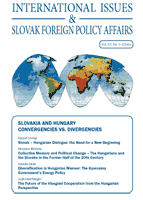The Future of the Visegrad Cooperation from the Hungarian Perspective
The Future of the Visegrad Cooperation from the Hungarian Perspective
Author(s): Judit HambergerSubject(s): Politics / Political Sciences
Published by: Research Center of the Slovak Foreign Policy Association (RC SFPA)
Keywords: Slovakia; Hungary; V4; EU
Summary/Abstract: After May 2004, the newly declared Visegrad Cooperation appeared in the Hungarian foreign policy and political public opinion – because of its history – as some sort of cooperation of a dubious nature. Its past has been judged on the basis of the fiascos and fruitless exercises. Left- and right-wing politicians alike share this view. However, its future perspectives and opportunities are being judged differently. On the whole, the left is sceptical while the right sees distinct opportunities in the future. They perceive its importance primarily in terms of the traditional good Polish-Hungarian relationship, the so-called Polish-Hungarian axis. The Hungarian foreign policy is facing a new situation: it must reconsider its objectives, tasks and interests. Foreign policy documents and concrete steps of Hungarian governments stress the importance of cooperation within the common foreign- and security framework of the EU, particularly with respect to Hungary’s role in the Western Balkans, as well as Hungary’s tasks in the Eastern policy – to mention but the joint actions of the V4 in these two areas.
Journal: International Issues & Slovak Foreign Policy Affairs
- Issue Year: XV/2006
- Issue No: 03-04
- Page Range: 91-107
- Page Count: 16
- Language: English

